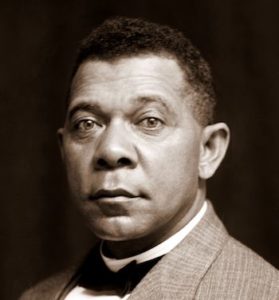
Booker T. Washington
Booker T. Washington was born on this date in 1856. He was a Black activist and educator.
Washington was born a slave on a plantation in Hale's Ford, in Franklin County, VA. After emancipation, his family was so poor that he worked in salt furnaces and coal mines at age nine. An intelligent and curious child, he yearned for an education and was frustrated when he could not receive good schooling. When he was 16, his parents allowed him to quit work to go to school. They had no money to help him, so he walked 200 miles to attend the Hampton Institute in Virginia. He paid his tuition and board there by working as a janitor.
Washington became a teacher, committed to the idea that education would raise him and his people to equality in America. He first taught in his hometown, then at the Hampton Institute, and then in 1881, he became the first leader of the Tuskegee Institute in Alabama. As head of the Institute, he traveled constantly to raise funds from Blacks and whites. He soon became a well-known speaker. In 1895, Washington was asked to speak at the opening of the Cotton States Exposition, a first-time honor for an African American. His Atlanta Compromise speech explained his central thesis that Blacks could secure their constitutional rights through economic and moral advancement rather than legal and political changes.
Although his pacifying stand angered some Blacks who feared it would encourage the opponents of equal rights, whites approved of his views. Thus, his significant achievement was to win over diverse elements among southern whites, without whose support the programs he foresaw and brought into being would have been impossible. In addition to Tuskegee Institute, Washington instituted a variety of programs for rural extension work and helped to establish the National Negro Business League. Shortly after the election of President McKinley in 1896, a movement was set in motion that urged that Washington be named to a cabinet post. Still, he withdrew his name from consideration, preferring to work outside the political arena.
In 1901, Washington wrote his autobiography, "Up From Slavery." As a politician, he was a chief Black advisor to Presidents Theodore Roosevelt and William Howard Taft. Washington kept his White following with conservative policies and moderate utterances. Still, he faced growing Black and white liberal opposition in the Niagara Movement and the NAACP, demanding civil rights for Blacks and encouraging protest in response to White aggression such as lynching, disfranchisement, and segregation laws.
Booker T. Washington, who urged Blacks to gain equality through education and economic advancement, died on November 14, 1915. One irony is that Washington's death marked the beginning of the Great Migration from the rural South to the urban North. Washington's racial philosophy, logically adjusted to the limiting conditions of his era, did not survive the change.
The African American Desk Reference
Schomburg Center for Research in Black Culture
Copyright 1999 The Stonesong Press Inc. and
The New York Public Library, John Wiley & Sons, Inc. Pub.
ISBN 0-471-23924-0